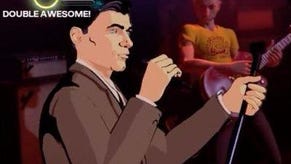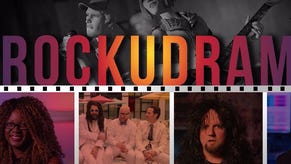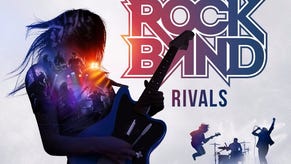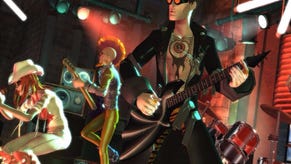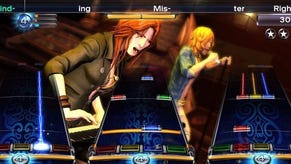3am eternal: The glorious return of Rock Band 4
Harmonix brings back the old favourites, with a little extra besides.
I love karaoke, and I'm a horrible singer. But that's okay - people don't go to karaoke to get a singing lesson, and folks don't play Rock Band to become a guitar hero or a rocksmith. A lot of music games might now focus on teaching players how to play real instruments and the like, but Rock Band is happily going back to basics after figuring out what's really important to its fans. "We really took a hard look at what the fantasy of Rock Band was," Harmonix' product director Daniel Sussman told me at a hands-on event. "What were we trying to do? And if we could go back in time and do it better, what would we do?
"Authenticity is funny because on the one hand it's like, you don't wanna be a caricature. At the same time what we're building is a fantasy, and Rock Band works because it invites you to sort of forget about the fact that you're in your living room. And it's a weird thing in the context of Rock Band 3 because I feel like we got away from the fantasy and, you know, I'm really proud of the work we did with Rock Band Pro and sort of the idea that rock band can be this gateway to actual music enjoyment. But that's not the point, you know, and the point is to invite people to get that feeling, that rush of what it feels like."
The rush of what that feels like is perhaps a lure for some people, but I think for a lot of others it's the ability to revel in some silliness with your friends to the (approximate) tune of some of your favourite songs. Hitting all the right notes and achieving 100 per cent on everything will always be the goal for more goal-oriented players, but for many the best Rock Band moments, historically, are when you're crooning along, adding your own flourishes or riffs or doing your best Christina Aguilera impression to a Darkness song - usually at 3am and with kebab sauce still on your fingers.
Rock Band 4's big focus is on this feeling; on giving players the power to express themselves. There's vocal improvisation, crowd interaction, new dynamic drum fill systems, and, its big new feature, Guitar Solos. These particular sequences, which can be turned on or off by the player, happen during specific moments in songs. The language shown on screen will change, so instead of the usual gems you'll see different coloured lines and waves and scores which guide the player into whether they should strum or shred.
It sounds complicated, and rather exhausting, but once you get the peripheral in your hands, it really feels quite natural - it's just about doing what feels good. I haven't got a lick of musical talent, but performing a solo momentarily fooled me into thinking I did. Personally speaking, my favourite part of playing any Rock Band game was tilting the guitar to initiate Overdrive; I could never do it without pulling my own gurning, lip-furling approximation of a heavy metal scowl because it always felt like a flourish, a mini-performance. That's kind of what Guitar Solos feel like. "Well, they do two things for me," says Sussman. "One is that they are an opportunity for people to paint outside the lines; you can do something that is original or unique or personal or whatever and actually, the skill curve is all about that axis, it's not about 'Do I sound good or not?' It's 'Am I doing the thing I meant to do?'
"The other thing they do which is actually very important is that they give you, the player, an opportunity to pick your head up and sort of look around and express yourself physically to perform, because you're not tied to those very articulate cues that are racing down the track, you know? And that was one of the things that we focused on a lot. Rock Band has this history of being a very social game but if you watch people play, a lot of times - especially if you're playing on hard or expert - it's four people who are glued to a, like, four inch by two inch tiny part of the screen and they're like zombies, right? They're not actually moving and they have no idea what anyone else in the band is doing until they get to the end game screen."
It's true that much of the time playing previous Rock Bands is spent ignoring the rest of your band. At times it feels more like a bunch of people playing their own single player games together in the same room rather than a multiplayer experience. Will Rock Band 4 feature more collaboration, for want of a better word?
"Collaboration is a loaded word because it implies that people are working together to create a thing, and what we're trying to do is develop a feature set that rewards you for paying attention to what other people are doing so it's more just that awareness," Sussman explained. "If you've ever played music with people who are not listening to you, it f**king sucks. And yet, when you're playing with people that are tuned in, that are listening, that's what it's all about. So some of the things we've done around unison phrases and some of the things that reward you for doing the same thing as a band - band streaks and band events - all that stuff is tied in to the game incentive, the reward for paying attention and for paying attention to what other people in your band are doing."
Stage presence is also a unifying feature. Bands can now play shows where they get together and select a few tracks to make a set list. When you're up there playing your gig, however, the game may suggest other songs that the band can vote for. Some may be named tracks, but others are more vague. It may ask if you want to play a song from the seventies, for example, or a genre-specific song. "You'll do a tour, do a show, and those shows can keep on going forever," says MadCatz' global PR manager Alex Verrey. "The crowd interaction is now so much more advanced. You can address the crowd when you come on stage. If you've played a track really well previously, the crowd will shout 'encore!' and they'll scream that track name. You can then choose to vote to do that track, you can leave the stage, or you can do something else. You can disappoint them too, so you want to keep the crowd on your side."
It's clear that Harmonix's main priority is pleasing the fans that have stuck by them; the ones that kept hold of their old peripherals and their library of songs - both of which will be fully compatible with the new game. "It was one of the things, frankly, that gave us the confidence that this would work, that there would be people there," Sussman said. "At GDC, when we were doing some of the advance press leading into our announcement, one of the first questions I got was 'why are you doing this? Why are you bringing this back? Why now? And upon reflection, the question that I turned back to them was 'well, are you excited about it?' And to a person, they were like 'yeah I can't f**kin' wait!' and it's like 'okay, well, that's why we're doing it'. Because you're not alone, a lot of people wanna see this come back.
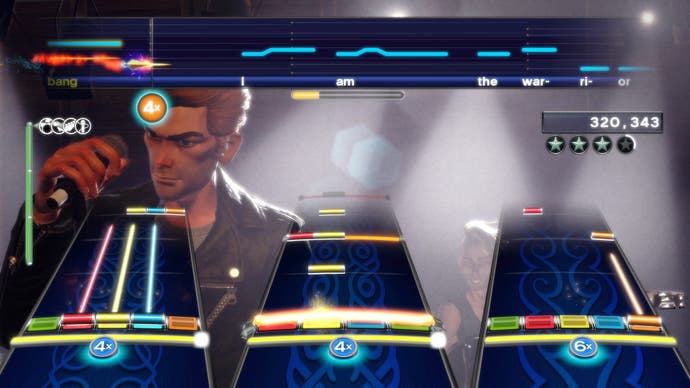
"[The music game genre] didn't go away in the same way people think it went away. And in fact, people have been making music games - I know because we've been competing with them. Just Dance has done really well, and you think about what the Ubisoft guys are doing with Rocksmith, and these are great games that people are playing and buying. I think a lot of folks were waiting for the bubble to burst and when it finally happened they were like 'Ah! I told you so! I mean it's been seven years but I told you so!' And for me it's not about a fad, it's about a fantasy."
Existing libraries of songs will still be specific to their original platform, but that's not through lack of trying on Harmonix's part. "We're getting away with everything we can; there's a lot of good will that we've generated with Microsoft and with Sony, and we'll take what we can get, really. That applies to the hardware also." Making older peripherals compatible with the new game and new consoles wasn't easy. "It's different technology. They're different radials and so it's just not engineered into the system, you know? And so the way it will work on the Xbox side is that there will actually be an adapter that connects wirelessly from your wireless guitars and then connects to the Xbox. We're basically designing a console that is essentially a hybrid Xbox 360 and Xbox One, just for musical instruments controllers. It pulls one and brings it through to the other."
So if you've still got your old drum kit, mic and guitars gathering dust somewhere, you can buy the game on its own and be ready to rock straight away, because, according to Verrey, they felt it was " the fair thing to do." If you're happy to invest further, however, the new instruments will feature various improvements on their previous incarnations. All the instruments at the event I attended were from Rock Band 3, because the new builds were "still being worked on." But, apparently, Harmonix and MadCatz took a long hard look at everything that had come before and decided to fix what was broken with a series of smaller, incremental changes.
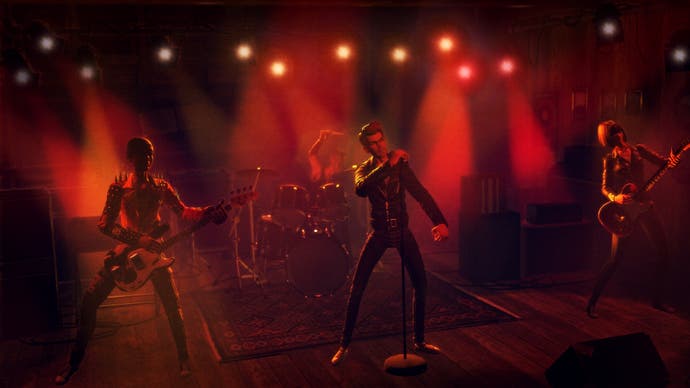
"The guitar controller, for instance, its fret buttons have been completely changed and redesigned," says Verrey. "We have something that we call positive force actuation here at Mad Catz. So we found that the fret buttons were very floaty before. They were kind of floaty, kind of clicky, a bit noisy. We've got a brand new switch that we've put on now you'll really know when you've pressed it, doesn't matter if you press the bottom or the top, you're just going to click down - it's really satisfying." Guitars also require one less battery for an increased life of up to 40 hours on PS4. The drum kit, Verrey says, was "more or less nailed" by the time Rock band 3 came around, but the kick pedal has been redesigned and the internal structure of the drum pads has changed to include some degree of shock absorption underneath the drum pad to prevent dimpling that was a problem with earlier sets. The microphone is a completely new identity, because as Verrey says, "the Rock Band 3 mic, quite frankly, just wasn't great." The new mic is 16bit and samples at 48khz, a far higher sampling than that of 3. "In fact," Verrey explains, "the mic can sample at a much higher rate than that, but the consoles can't interpret it."
I feel like Rock Band is a game that you'll either get, or you won't. It isn't about realism or, god forbid, learning something. It's about letting go and having fun. "It's not about an austere, like rigid sort of perspective around like 'no this has to be real', because real is not actually as fun as the fantasy, and that's what I love about the freestyle guitar stuff," says Sussman. "It's an invitation for you to just have that moment of, like, unbridled music ecstasy. You know there's just something really powerful about that because it's an emotional thing, it's not about the game design it's about this relationship that you have to the song because you're building something. You're making something."
That something, in my case, will probably be wicked sweet riffs played with that certain fervour that only 3am brings. And I'm down with that.




